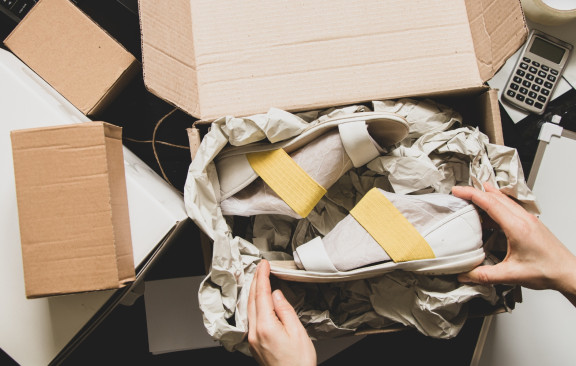Hey, would you like to pay tax that you don't actually need to pay?
I'm guessing your answer is a big, fat "Nope." No one does, which is why if you're going to get into the retail business, you need a reseller's permit (also called a resale license, reseller's license, resale certificate or reseller's certificate, sales tax permit or sales tax ID).
If you're a US-based seller, you don't need to pay sales tax out of your own pocket for the products you're reselling to others. Your customers will pay it when they buy the product. You'll collect the money and send it to the state on a routine schedule.
A reseller's license is your flag saying "I sell to others. I can buy wholesale products without paying sales tax because I pass the tax onto my customers."
What is a Reseller's Permit/License?
A reseller's permit or license is the documentation you need to avoid paying tax on items that you’re going to resell to customers. The sales tax for an item only needs to be paid once, and it’s paid by the end customer, not you as the seller. A reseller's permit lets your suppliers know that you are licensed to sell the items on, and that they can sell them to you without collecting the sales tax from you. Many suppliers will require a reseller’s license before they will do business with you.
Note that your reseller’s license will only allow you to avoid paying tax on items you successfully resell. If you are buying items for your business that you won’t be reselling, or you don’t end up reselling the items you’ve bought, you will be responsible for the tax on those items.
How Do I Get a Sales Tax ID/Reseller's License?
Half the trouble with signing up for a sales tax license is finding where to go!
To get started, you need to find your state tax department. For example, someone based in New York would go to the New York State Department of Taxation and Finance (either online, by phone or in person) and fill in the appropriate form.
You'll find that when you've made your way to the right website, most of the information and forms you need are just waiting for you.
That's why I've got this nifty map to help you find your way faster:

and register for your license.

Once you get your sales tax ID, the state will start sending you monthly/quarterly statements. In some cases, states will use your federal EIN as your sales tax ID. In some cases, they'll issue you a separate number.
How to apply for a Reseller’s Permit in 3 easy steps
Applying for a Reseller’s Permit is actually really easy once you have the required information and documents ready, especially with the handy map we’ve created for you (see above). All you need to do is click on your state and you’ll be taken to a page where you can apply for a permit online.
However, I know from experience that filling out government forms can be daunting, especially when you’re just starting out. So let’s go through the process step-by-step.
The first step is figuring out which states you need a Reseller’s Permit for. If you are running a business from home and don’t have any storage facilities or offices in other states, then you only need a Reseller’s Permit for your home state. If you have an office in one state and storage facilities in several other states, you will need to apply for a Reseller’s Permit in each of those states, because you have “nexus” in those locations. Use our map to get the relevant information for each state.
See more about what ‘nexus’ means below.

There’s quite a bit of information you need to provide, so it’s best to get it all ready before you start the process. You’ll need to provide personal identification (social security number, date of birth, driver’s license, or state-issued identification number). You’ll also need to provide documents about your business, such as your bank account information, names and locations of your suppliers, and your anticipated monthly sales figures.
Depending on the state you’re applying in, you may be asked about the structure of your business and its ownership (sole proprietor, general partnership, LLC, nonprofit).
If your business is a corporation or an LLC, you may be asked to provide the incorporation date, corporation number and FEIN number.
And if you’re applying from outside the US (say you live in Germany, but you have a storage facility in California, you
Some states require personal references and other information. You can enquire with your local county clerk’s office to find out exactly what’s required by them. Or click on your state on the map and the website should say what information they need.
Using all of the information you’ve collected, you can now apply for your Reseller’s Permit. You can complete the application online or in person. Remember, you will need to apply for a Reseller’s Permit in all of the states where you conduct your business. If you have any questions, I recommend contacting your local county clerk’s office, or the relevant local authority as they have the most up-to-date information.
You may have to pay a small fee to file your application.
Sales Tax: A Brief Overview

Sales tax is a tax levied on all sales of physical goods to consumers within most states. Some states also charge sales tax for certain kinds of services.
Not all states charge sales tax: if you live in Delaware, Oregon, New Hampshire, Montana or Alaska, then sales tax either does not apply or applies only in certain circumstances. For sellers in any other state: yes, you do need to worry about sales tax!
You can find your state's sales tax rate here. It is important that you do this, because taxes vary significantly among the different states. For instance, some have one rate that applies state-wide, while in others, the rate varies between counties and cities.
Determining what state(s) you need to pay tax comes down to where you operate. A base of operations is called a "nexus." If you are dropshipping from home, you'll only be responsible for that state's sale tax because you only have one nexus. If you have a storage warehouse in another state, you have a nexus there, too. If you opt to ship goods via Fulfilled by Amazon, you technically have a nexus in whatever state(s) your goods are warehoused in.
Note: In some states you also need to collect sales tax on shipping and handling.
You can learn more about sales tax here.
A Bit of Extra Information for You
There are a few other things to consider when looking into the taxes you'll be responsible for as a seller.
-
Reseller's Permits and Buying Wholesale
If you are a US citizen purchasing wholesale goods from a supplier within the US, then you will probably need a resale certificate or license from the state in which your business is located.
A resale certificate or license enables you to purchase goods wholesale without paying sales tax. It also allows you to collect sales tax from your customers, the end consumer.
Without a resale certificate, you will have to pay sales tax on the goods you buy wholesale and then also charge sales tax. In this case you can add the sales tax you paid as a deduction on your return, but it is much less complicated to just present your reseller's license when you buy.
Most wholesalers will ask to see a sales tax ID or reseller's license before they will sell you the goods. This is because they are legally obliged to check whether you are able to collect sales tax from the end user.
-
Use Tax
Another thing you may come across is something called "use tax." This tax is in place to discourage people from shopping in states with lower taxes than their own.
Use tax means that if you purchase goods in another state, you owe tax equal to the amount you would normally have paid in your own state. It will also apply to you if you buy goods intended for resale and then end up keeping them for your own use.
The good news is, if you are based in one state but ship to customers in another, you're not obligated to collect sales tax or deal with use tax at all. Just as you're responsible for paying the use tax if you get your supplies from out of state, your consumers are responsible for the use tax when they buy from you. Additionaly, the benefits of tax in trust can provide additional insights into how this responsibility is managed in such cross-state transactions.
Obviously you could potentially get away without paying use tax because it works on an honor basis. However, should you be audited, use tax is something auditors like to hone in on. As a result, many new businesses get caught in the cross-hairs. Therefore it is wise to make sure that you pay it and keep the appropriate records.
-
Collecting Sales Tax on eBay or Your Website
The process for collecting sales tax will differ depending on where you're selling.
If you're selling on eBay, for example, you can learn how to collect sales tax on eBay here. The process basically looks like this:
- Go to "My eBay."
- Click the "Preferences" link from the left-hand navigation bar.
- Click "Show" in the "Payments from Buyers" section.
- In the "Use Sales Tax Table" section click "Edit."
- The "Sales Tax Table" page appears.
- Find the state you want to start charging sales tax in and put in the correct sales tax amount in the "Sales Tax Rate" field. You can also opt to charge sales tax on shipping and handling, if it's required.
If you're selling on your own online store, or if you're planning to in the future, things can get a little tricky if you're not careful!
The best thing to do in this case is hire an accountant, or use tax software such as Avalara to keep track of the sales tax you need to collect and pay.
If you create your own online shop with SaleHoo Stores, setting up your sales tax collection is automated and easy.
-
Records to Keep
You need to keep your resale certificate(s) on file as part of your business records. You must be able to match your sales records with the certificates for audit purposes.
-
Reporting Sales Tax
How often you need to complete Sales and Use Tax reports will depend on your monthly sales turnover and the state you are working from.
It's very important you are sure to collect the correct amount of sales tax, as you will be held liable for the difference if you come up short.
Note: Trading Assistants do not need to collect or remit sales tax.
Common Questions on Reseller Licenses Answered!

These are not the same thing. A seller’s permit/resale license is the same as a state tax ID, as both are issued by the state for sales tax purposes. An EIN or federal tax ID number, however, is issued by the federal government, not the state. The EIN is used to hire employees and manage employee taxes, and it is also used to file business taxes, while state ID numbers are used to file sales taxes. Here is the difference between an EIN and a state tax ID according to the IRS (you can register for an EIN there too).
To break things down a little further, a seller’s permit and a resale license aren’t quite the same thing either. A seller’s permit, sometimes called a "sales tax" permit or license, allows you to collect sales tax from your customers, while a resale license allows you to buy items you’re going to resell without paying tax for those items yourself. Some states prefer one term or the other, and many states combine the documents into a single license or state tax ID. You’ll find the requirements for your state when you register with them. To find the registration for your state, click on your state in the map further up in the post.
Although reseller permit can vary a bit from location to location, most of these licenses will include basic information about the business such as the name and address of the reseller, their license number, business type, location issuing the permit or license, and the basic scope of what the reseller can purchase with their permit. Of course, there may be other information on the permit, which can vary from location to location.
If you want to buy products to sell, and you don’t want to pay sales tax on those items, you will need a reseller’s permit/license. For example, if you want to buy wholesale products to sell on eBay or your online store, you’ll need a reseller’s permit/license to avoid paying tax on those items. Suppliers will often require you to present one before they’ll do business with you.
There are some states that don’t have sales tax, including Alaska, Delaware, Montana, New Hampshire, and Oregon. If you live in these states, or conduct business out of them, you might not need a reseller’s permit or license for these states. How this is managed depends on the state; Oregon, for example, issues a resale certificate for presenting to suppliers, while New Hampshire doesn’t issue licenses at all. You can use the map further up in the post to find the information pages for these states to find out whether you need a license.
Before you start using your resale certificate, you’ll have to double check to make sure that you are registered to collect sales tax with at least on location (whether it’s a state, province, or any other location). The reason for this is that this will serve as proof that you are truly a business and not just an individual trying to resell items. This also proves that you are eligible to buy items tax free. Note that a resale certificate isn’t a specific document. Actually, it could be a letter, note, pre-printed form, or purchase order. But what differentiates a resale license from any other document stating similar information? To qualify as a resale license that can be used for dealing with businesses, each document needs to contain the purchaser’s name and address, the type of business you’re running, the description of the products and goods that you are purchasing for resale, the purchaser’s signature and title with date, and of course, the purchaser’s seller’s permit number.
Your seller's permit number can be found on your seller's permit. Once you apply for and receive your permit, you'll be able to locate your seller's permit number any time you should need it.
An Employer Identification Number (EIN), sometimes called a Federal Employer Identification Number (FEIN), is like a personal ID number for a business. Businesses use their EIN to pay employees, and to file business tax returns. Some banks require an EIN before they’ll let you set up a bank account for your business.
If you are a sole proprietor, you may not need to get an EIN, as you may be able to use your Social Security number instead. However, you might consider getting an EIN anyway, as this stops you from having to provide your Social Security number to others, which ultimately protects you from identity theft. You can register for an EIN here.
Sales tax is pretty much exactly what it sounds like: a tax applied to the sales of goods and services. The sales tax for an item or service is meant to be paid only once, and it’s meant to be paid by the end customer. When you’re buying items to sell on, you’re not the end customer, which means it’s not up to you to pay the sales tax for that item. That’s where your reseller’s license comes in! The license tells suppliers you’re a seller, and that they don’t need to charge you sales tax.
Generally, if you’re selling goods, you will collect the sales tax for those items from your customers when they buy from you. You’ll then pass that sales tax on to the state government.
Depending on the country you are based in, we recommend contacting an accountant or lawyer to clarify your sales tax obligations for selling outside of your country, as the required tax charges vary significantly between countries.
A resale number is the number attached to your reseller’s permit or license. When you get a reseller’s permit or licence from your state government, it will have your resale number. You can then give this number to suppliers to buy goods for resale without paying the sales tax for those items.
A resale certificate is yet another name for a reseller’s license or permit. This means it has the same function: to allow you to buy items for resale without paying the sales tax for those items yourself.
You’ll present your resale certificate to suppliers to show that you’re certified to buy their stock without paying tax, because you’ll be charging your customers the sales tax for those items.
A wholesale license is yet another name for a reseller’s licence. To get a wholesaler’s license, you’ll apply through the preferred application system of the state you live in or conduct business out of. Most states have an online application system to make it faster and easier for you to apply.
To register for a wholesaler’s license in your state, use the map further up in this post. Simply click on your state to go through to the registration page or info for your state. If you’re not sure about your specific situation, you can try contacting your state’s tax department to ask.












470 Comments